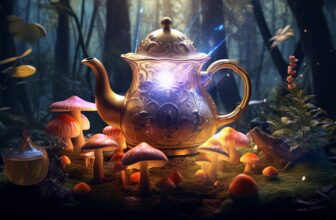
Get ready for a fascinating journey as I set out to explain why tea, a staple beverage for many of us, often leaves our mouths feeling dry. Drawing insight from scientific research and expert opinions, together, I’ll explore the chemical reactions occurring in our mouths after a delightful sip of tea and how these interactions result in that peculiar sensation of dryness. Let’s unravel yet another mystery of our everyday lives!
Physiological Reaction to Tea
Tea is a popularly consumed beverage all over the world. But have you ever wondered what happens when we consume tea?
What happens when you drink tea
When you sip a cup of tea, our body absorbs several components present in the tea leaves. The taste and aroma of the tea engage our senses, and the physical and chemical constituents begin to interact with our body systems, setting off a range of responses.
The role of the nervous system
The nervous system plays a crucial role in our body’s reaction to tea. The caffeine in tea acts as a stimulant, affecting our brain and leading to a state of alertness and sharpness.
How the digestive system responds to tea
Upon entering the digestive system, the components of tea have a variety of effects. For example, some teas like green or black stimulate digestion, making you feel a sense of relief if you were feeling bloated or heavy.
Components of Tea
Tea, especially when unprocessed, contains a variety of components contributing to its mouthfeel, flavor, and physiological effects.
Types of tea
There are principally four types of tea- green, black, white, and oolong- differentiated mainly by their level of fermentation or oxidation. Each type has a distinct flavor, aroma, and varying components.
The impact of caffeine
Caffeine is a significant component of tea, contributing to its stimulating effect. The amount of caffeine varies between tea types and even within the same type, depending on factors like brewing time and temperature.
Other chemicals present in tea
Apart from caffeine, tea contains several other chemicals such as polyphenols, tannins, and theanine. These components are responsible for the astringent and calming effects of tea.
The Concept of Mouthfeel
The ‘mouthfeel’ of tea is an essential dimension of the tea-drinking experience.
Definition of mouthfeel
Mouthfeel refers to the physical sensations experienced in the mouth when consuming food or beverages. It encompasses aspects such as viscosity, creaminess, hardness, and astringency.
How tea affects mouthfeel
Proteins and minerals contribute to the creamy or ‘thick’ feel of tea, while tannins and polyphenols impart a dry, puckering sensation also known as astringency.
Contrasting mouthfeel in different types of tea
Different teas provide varied sensations of mouthfeel. For example, green tea can lean towards a more astringent mouthfeel, while black tea may contribute to a smoother, richer sensation.
Astringency in Tea
One of the key aspects of tea’s mouthfeel is its astringency.
Understanding astringency
Astringency can be described as a dry, puckering sensation experienced in the mouth and is a significant sensory characteristic of tea.
Causes of astringency
Astringency results from the interaction of certain compounds, like tannins, with proteins present in our saliva. This interaction forms clumps or precipitates, leading to reduced lubrication and a feeling of dryness in the mouth.
Tea and astringency
Tea, especially freshly brewed tea, contains high levels of tannins, which result in strong astringency.
Polyphenols and Tannins in Tea
elaborating on two compounds that play critical roles in tea’s astringency, polyphenols, and tannins.
Defining polyphenols and tannins
Polyphenols and tannins are a form of antioxidant found in a variety of foods, and notably, in tea. They contribute largely to color, flavor, and astringency.
How polyphenols and tannins contribute to dryness
Polyphenols and tannins in tea bind with salivary proteins causing them to precipitate or clump together. This reduction in the saliva’s lubrication capabilities results in a dry, puckering sensation, or astringency.
Variation of polyphenols and tannins in different teas
Different teas have varying concentrations of polyphenols and tannins. Oftentimes, the more potent a tea’s flavor, the higher its polyphenol and tannin content.
Prolonged Effect of Tea
Tea can have both immediate and prolonged effects on our oral sensations and health.
Long term impact of tea on mouth dryness
Repeated exposure to astringent teas can lead to chronic feelings of mouth dryness. However, some tea drinkers report growing more accustomed, and even fond, of this sensation over time.
Tolerance and adaptation over time
With regular consumption, the human palate can adapt to the astringent taste of tea and even learn to appreciate it as a refreshing and cleansing sensation.
Impact on oral health
While excessive consumption of highly astringent tea can lead to chronic mouth dryness and related problems, the antimicrobial properties of tea can contribute to oral health by keeping harmful bacteria in check.
How to Reduce Dryness
If you’re not a fan of the astringency in tea, there are strategies you can employ to decrease it.
Choosing less astringent tea types
Selecting teas with lower tannin levels, like white tea or certain green teas, can help reduce the level of astringency.
Brewing techniques to reduce dryness
Brewing tea at lower temperatures, or for shorter periods, can also help to minimize its astringency.
Complementing tea with other beverages to balance dryness
Alternating sips of tea with water or a non-astringent beverage can also help to balance the dry-mouth sensation.
Health Benefits and Risks of Tea
The health implications of tea go beyond its immediate sensory effects.
Antioxidant properties of tea
The polyphenols and tannins found in tea have potent antioxidant properties, combating free radicals in the body and contributing to overall health.
Possible risks associated with excessive tea consumption
Excessive consumption of tea, particularly strong, astringent ones, can lead to chronic dry mouth, causing discomfort, difficulty in swallowing, and may occasionally contribute to oral health problems.
Balancing health benefits and dryness
But, with careful selection of tea types and brewing practices, it is possible to enjoy the health benefits of tea while mitigating the oral discomfort associated with astringency.
The Influence of Culture on Tea Consumption
Cultural context significantly influences the consumption and perception of tea.
Perception of mouth dryness in different cultures
Across the globe, perception and acceptance of astringency or mouth dryness vary. What might be perceived as pleasantly refreshing in one culture could be considered excessively dry in another.
Cultural practices that mitigate dryness
Different cultures have devised their ways of counteracting tea’s dryness: some prefer to sweeten their tea, others enjoy it with milk, and still, others brew it lightly to reduce astringency.
Variation of tea preparation across cultures
The way tea is prepared differs wildly across cultures, contributing to variations in flavor, aroma, mouthfeel, and perceived astringency.
Expert’s Insights on Tea-related Dryness
Professionals from various fields have shared their insights into the dry-mouth phenomenon associated with tea consumption.
Views from food scientists
Food scientists explain the astringency as a result of interactions between the tannins in tea and proteins in saliva. They suggest that by altering brewing techniques, we can affect the release of these compounds and therefore control astringency levels to some extent.
Dentist’s advice for frequent tea drinkers
Dentists advise frequent tea drinkers to stay hydrated and maintain good oral hygiene to counter potential side effects of prolonged dry mouth.
Tea connoisseurs’ take
Tea connoisseurs often consider astringency a desirable quality, indicative of a high-grade, well-brewed tea. For them, the associated mouth dryness is not a deterrent but a part of the entire sensory experience that makes tea drinking a valued ritual.
In conclusion, the dry-mouth sensation or astringency experienced while drinking tea is influenced by various factors ranging from the chemical composition of the tea to the consumer’s saliva composition, genetic taste profiling, and even its cultural context. By understanding these factors, one can better manipulate the tea-drinking experience to adhere to personal preference and comfort.
Hi, I’m Mat Boehmichen, the author behind The Tea Masters Hub. I’m passionate about all things tea and I want to share that passion with you. At The Tea Masters Hub, my mission is to provide you with all the knowledge and resources you need to truly understand and appreciate tea. Whether you’re a novice or a seasoned tea enthusiast, I’m here to guide you on your tea journey. From the art of preparation to the joy of sipping, I’ll teach you everything there is to know about tea. So join me on this flavorful adventure and let’s explore the world of tea together.










